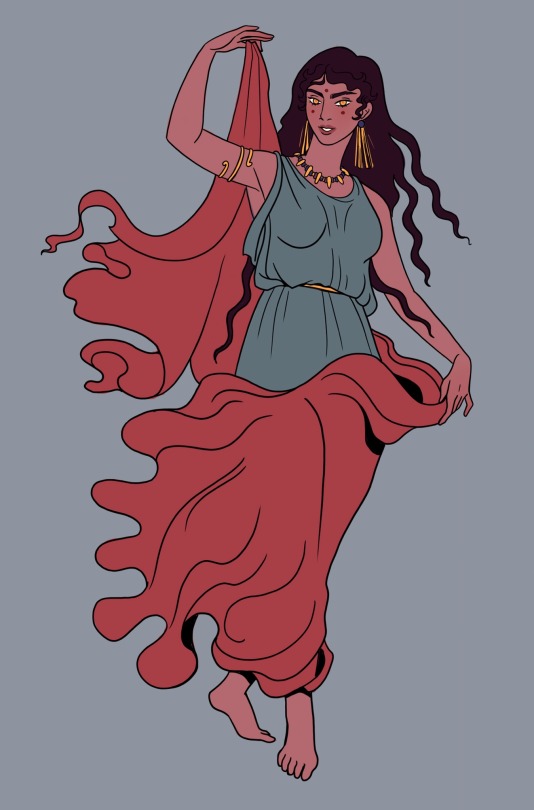Text
“Give Aphrodite a red candle!” “Give her a blue candle!” Give her a candle of your favorite color. Tell her why you love it so much; is it just comforting or does it symbolize something to you? When you see that candle you’ll think “aw I love that color!” That’s literally what some of her epithets personify her as, that feeling of love and warmth! Just an idea idk 🤷♀️
633 notes
·
View notes
Text
devotional acts are the best because I already sing a lot so now I can just be like “And this next one is for Lord Apollo!” and proceed to destroy my vocal chords
825 notes
·
View notes
Text

ꔣ₊˚ lady selene .ᐟ 𝓭𝓲𝓰𝓲𝓽𝓪𝓵 𝓸𝓯𝓯𝓮𝓻𝓲𝓷𝓰 ִֶָ࣪☾. happy monday ꯁ
101 notes
·
View notes
Note
Hey what your upg on barbale the Georgian mythology?
Hello! Thank you for asking!
Barbale is a Georgian goddess of cattle and poultry fertility, women’s fertility, the sun, and healing. Because of this, I find that she takes on a more motherly role. She’s very encouraging, but also lets you make mistakes.
For offerings, I tend to look towards offerings to Apollon and Hera, since I also worship them. Milk, eggs, and other animal products are good. Yellow things are great, especially lemons. Any medications or pain relief is also great for her.
For devotional acts, I do the same. Any creative act works. Taking care of yourself, others, family, and animals is great. Volunteering at animal shelters and the like is a common thing for me. Sitting out in the sun is also amazing.
This may be different for you (and others), but these are just my UPGs. If you have anymore questions, please feel free to ask!
4 notes
·
View notes
Photo
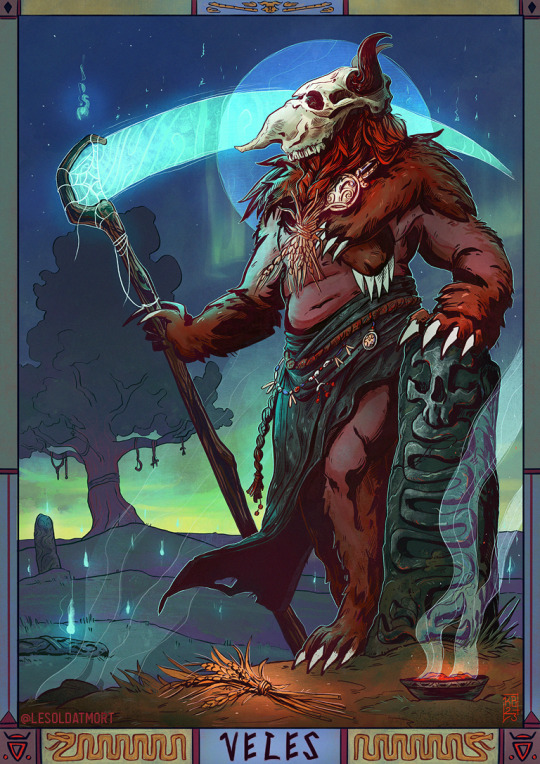
| VELES |
The transcendent mage with horned crown who shepherds the dead.
Veles (Volos), most known as the god with head of a cow/bull and the shepherd overlooking the endless pastures of the underworld where the souls peacefully reside.
More (folk)lore, info and WIPs of this project on my P/treon.
163 notes
·
View notes
Text
There's nothing more romantic to me than Hera and Zeus in Their celestial aspects. She's the Goddess of the Sky and Stars. He's the God of the Sky and Storms. I bet They just dance around in the aether making pretty colors sometimes.
750 notes
·
View notes
Text

Apollo Playing The Lute by Briton Riviere
And as Apollo played his enchanting music for Admetus’ flocks, the spotted lynxes came out of the Othrys valley to join them, and so did a pride of fiery-blond lions and the dappled fawn. Moved by the charming music of your lyre, Apollo, they had stepped out from behind the fir trees and with their airy feet, rejoiced in a dance.
- Euripides, Alcestis (trans. George Theodoridis)
503 notes
·
View notes
Note
Hi Zeke
I've been looking into hellenic paganism and Norse paganism for a while now and your blog's been really helpful! One thing I really want to do is pray informally to the gods however I've been struggling with not knowing how it works on their end I suppose
I was raised Christian, and that when I pray he listens and answers every prayer. And it might be a silly question but I don't know if the greek or Norse gods are listening let alone responding.
I guess this mini ramble is me asking do the gods listen to all the prayers? Sorry if it's something you aren't comfortable answering or poorly phrased
Thank you 💛
This is very much a thing that varies person by person! I (and most others) personally do believe that they listen to every prayer, and depending on the request, may respond through real-world occurrences and happenings.
Most everyone believes that the gods live in a separate plane from humans and therefore have no restraints with time as we do, leading to most of us believing that they can (and do) respond to all prayers.
So while it is varying, I (and most people in our religions, in my experience) believe that they do listen and respond to our prayers.
#ask#asks#answer#answers#yes very much not the same for all#but for me and i think most people#they do listen#and they do respond when they deem fit
3 notes
·
View notes
Text
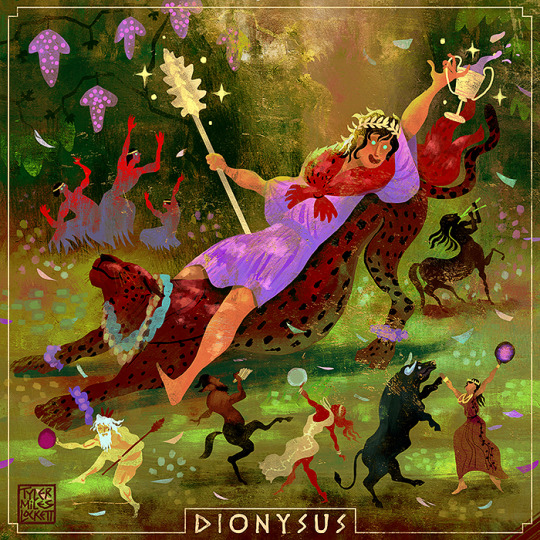
DIONYSUS
“I begin to sing of ivy-crowned Dionysus, the loud-crying god, splendid son of Zeus and glorious Semele. The rich-haired Nymphs received him in their bosoms from the lord his father and fostered and nurtured him carefully in the dells of Nysa, where by the will of his father he grew up in a sweet-smelling cave, being reckoned among the immortals. But when the goddesses had brought him up, a god oft hymned, then began he to wander continually through the woody coombes, thickly wreathed with ivy and laurel. And the Nymphs followed in his train [10] with him for their leader; and the boundless forest was filled with their outcry.” (-Homeric Hymn, translated by H.G. Evelyn white)
DIONYSUS (die-uh-ny-sus) the god of wine, vegetation, festivity, and on a darker note, madness and frenzy. Here we see our jovial deity riding a leopard and wearing a leopard skin, holding aloft his sacred wine chalice in one hand, and his pine cone tipped staff "Thyrsus". Below him dance his attendants in the cult of Dionysus, the Sileni, satyr, centaur, woman dancer, and bull and woman, with a centaur playing the Aulos (two head flute pipe). In the upper left-hand background, we can see hanging grapes for the wine, and below; a darker representation of Dionysus; the mad frenzy. Here we see the Maenads; "raving ones,” women followers who drink and dance into violent frenzies. In Euripedes’ play, "the Bacchae'', the Maenads, in a state of delusion, tear apart their own king Pentheus, limb from limb, thinking him a lion. Even poor Orpheus, the greatest lyre player of all, was torn apart when he refused to play for them in a state of mourning after returning from the underworld without his wife, Eurydice.
Support my book kickstarter "Lockett Illustrated: Greek Gods and Heroes" coming in early 2024.
278 notes
·
View notes
Text
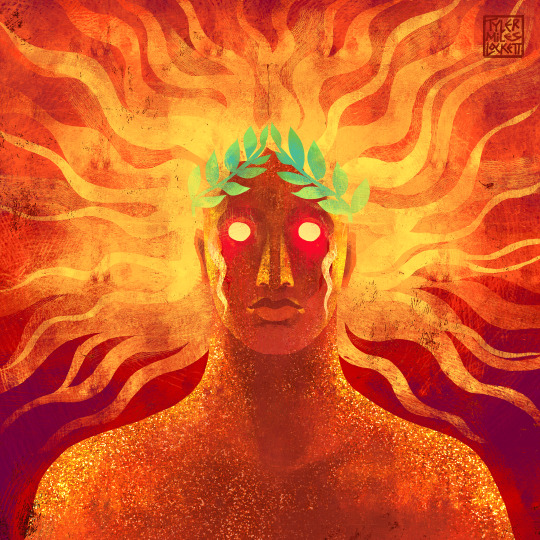

Apollo and Cassandra illustrated by me
According to Aeschylus’s tragedy Agamemnon, Cassandra was loved by the god Apollo, who promised her the power of prophecy if she would comply with his desires. Cassandra accepted the proposal, received the gift, and then refused the god her favours. Apollo revenged himself by ordaining that her prophecies should never be believed. She accurately predicted such events as the fall of Troy and the death of Agamemnon, but her warnings went unheeded. During the sack of Troy, Ajax the Lesser dragged Cassandra from the altar of Athena and raped her. For this impiety, Athena sent a storm that sank most of the Greek fleet as it returned home. The rape of Cassandra by Ajax was a favourite scene in Greek art. In the distribution of the spoils after the capture of Troy, Cassandra fell to Agamemnon and was later murdered with him. Her foresight and the ensuing disbelief she faced serve as a reflection of the inherent ambiguity and complexity of prophecy in Greek mythology, where knowing the future doesn't guarantee the power to change it or gain the acceptance of those around you.
Support my book kickstarter "Lockett Illustrated: Greek Gods and Heroes" coming in early 2024.
Linktree:https://tr.ee/DcjSQDSEv3
362 notes
·
View notes
Text
A Modern Understanding of Dionysus Hestios
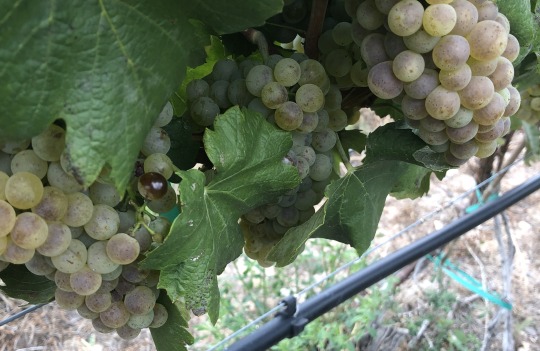
Photo from a vineyard I worked on.
[ID: A close-up image of a Chardonnay white-wine grapevine with three clusters. The clusters are green with some red. Bright green leaves cover the top of the clusters, while below a black irrigation line is visible. The ground below is covered in woodchips, except for a single plant below the clusters].
HESTIOS IS A FUN YET OBSCURE EPITHET OF DIONYSUS. We can infer some of its context due to Zeus Hestios, that being a protector of the home and hearth. This epithet of Dionysus is a favourite of mine—for my home and hearth, he is a household deity as I am a viticulturist and winemaker. My life and livelihood is partially bound by grapevines as I currently work at an orchard that is establishing a vineyard and my responsibility is to make it happen.
The context of this epithet is little known beyond a passage in Pausanias’ iconic Description of Greece:
Pausanias, Description of Greece 1. 2. 5 (trans. Jones) (Greek travelogue C2nd A.D.) : "From the gate to the Kerameikos [in Athens] there are porticoes . . . containing shrines of gods, and a gymnasium called that of Hermes. In it is the house of Poulytion . . . [which] in my time it was devoted to the worship of Dionysos. This Dionysos they call Melpomenos (Minstrel) [i.e. of Melpomene, the muse of tragedy], on the same principle as they call Apollon Mousegetes (Leader of the Muses) . . . After the precinct of Apollon is a building that contains earthen ware images, Amphiktyon, king of Athens, Dionysos Hestios (Feasting or Of the Hearth) and other gods. Here also is Pegasos of Eleutherai, who introduced the god [Dionysos] to the Athenians. Herein he was helped by the oracle at Delphoi, which called to mind that the god once dwelt in Athens in the days of Ikarios."
Dionysus Hestios is mentioned in Athens, along with his myth of his devotee Pegasos bringing his cult to the city. Other than references to Zeus Hestios, I have not found any more context for this epithet beyond protecting the home/hearth. Therefore, this aspect of him will be a contender for a strong upg basis.
In my times in wine, I’ve gathered my own gnosis of Dionysus Hestios. He is a protector of the hearth, but in my personal experience, the table wine aspect of Dionysus.
TABLE WINE IN THE MODERN WORLD
Table wine is named exactly for what it is, a wine that sits at your dinner table and a key part of a meal. Italy especially is famous for its cheap table wines, many of which I’ve had at my own tables and dinners. Most commercial wines these days are made to be drinkable on their own—while table wines are uncomfortable and harsh on the tongue. With food, they transform, turning these harsh and bitter wines into something truly enjoyable. It also makes the food taste better. For anyone unknowing, that’s why wine and food pairing is a thing. Unfortunately, the table wine market is slowly beginning to crumble—most modern wine drinkers enjoy more of a good tasting drink instead of a complement of one’s meal. If you have the chance, I recommend buying some and trying it in pairings—it’s a dying market, sadly, and one that has an ancient history behind it.
While table wines slowly fade, there is always a place for them in our lives. I myself have fond memories of a terribly bitter wine being served at my family’s table, and while I hated the taste, I’ve come to fall in love with them in recent years. Dionysus Hestios as a god of the home is a god of table wine, the happy smiles and festive memories of people having their Chianti with some steak or pasta. It’s the thrill of a good food pairing, a decanter, and the hundred years history of people making wine for the common folk instead of just for the aristocrats and their “noble” grapes.
Dionysus Hestios, Hearth warmer, master Of your craft, joy becoming Protect our heart and wine, Let us dance and joy, Under your blessings Of the woody grapevine.
References
DIONYSUS CULT 1 - Ancient Greek Religion. (n.d.). https://www.theoi.com/Cult/DionysosCult.html
304 notes
·
View notes
Text

#dionysus#and he’s screaming at me apparently#i got this post 5x in a row reblogged by various mutuals
45K notes
·
View notes
Text

A doodle of Apollo, with deer-ears for a change.
212 notes
·
View notes
Text
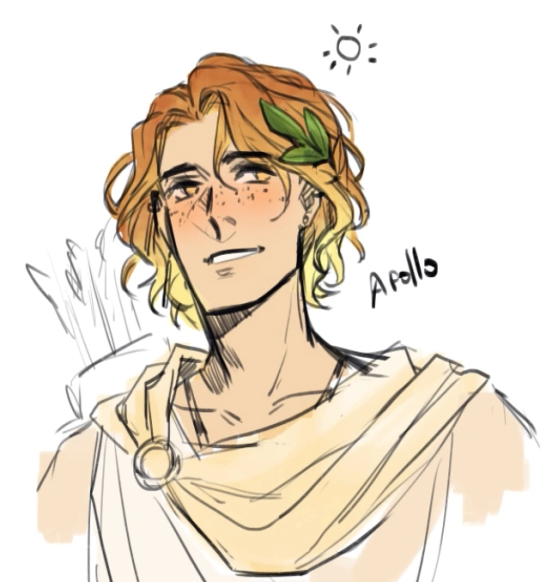
I'm pretty sure I'll redraw it.. perhaps, or I will complicate his look...
372 notes
·
View notes
Text

Ariadne
"She was the darling of the gods and she has her emblem in the sky..."
894 notes
·
View notes
